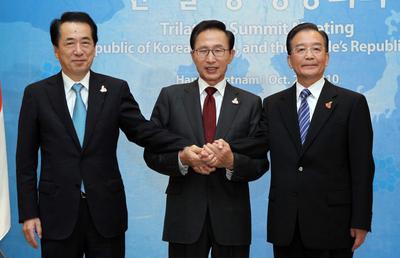Secondly, they decided to double the size of the CMI (to US$240 billion) while electing to leave in place the IMF link which limits the CMI’s independent capacity to act in a crisis. The CMI has seen further institutional progress despite major competition, even rivalry, between the players and now seems on track to emerge as a fully fledged Asian Monetary Fund (AMF) in the not too distant future. Already, it is possible to detect some of key characteristics of this future AMF.
The selection of a Chinese national as the first head of the CMI’s surveillance secretariat of AMRO is no accident — indeed it was a bitterly fought diplomatic battle. Typical of the CMI negotiations thus far, the outcome was a compromise between China and Japan. While Wei Benhua will lead the organisation in its critical first year, he will not see out the full term of three years. Instead, Wei will step down to allow the younger Japanese national Yoichi Nemoto to take over.
Placing Wei as the director is a victory for China. While Japan has pioneered the development of the institution, both the secretariat and the directorship were prizes which the Japanese were not able to win. In addition to the symbolic victory for China of having a Chinese national leading the CMI — marking China’s clear transition to the East Asian leader in terms of the provision of regional public goods — the first director of an international institution sets the tone for future institutional developments. One should therefore expect decisions made this year on personnel and AMRO’s structure to favourably position China institutionally. It is not clear if Nemoto will be able to revise (or reverse) those norms after taking over (even if he were to win a second term).
The most significant area to watch in this regard is the initial set up of the surveillance process. AMRO has been charged to undertake this surveillance function by the APT Finance Ministers, which is recognised formally as ‘an effective tool to prevent a financial crisis in the region’. More importantly, surveillance is also essential if the CMI is to ever deliver in providing a loan to a crisis-struck regional member. While Wei is publicly on record noting that ‘AMRO members [are] more aware of the necessity of stepping up the regional macroeconomic surveillance‘, China is much less interested in surveillance than either the other two bankrollers of the project, Japan or Korea. In fact, China recently watered down attempts at the G20 to formalise benchmarks of international imbalances while Article IV surveillance at the IMF is not providing adequate results. It is likely that the first director will choose not to actively promote surveillance.
Rather, Wei is more likely to focus on the IMF link. Not only is this an area in which China is more interested, but it is also an area in which cooperation (and success) is also more likely. The majority of the Southeast Asian nations are very keen supporters of loosening the IMF link and even Korea is positively disposed towards it.
Indeed this is exactly what China proposed during the latest round of the APT Finance Ministers, suggesting that the CMI should delink 30–40 per cent of its funds from the IMF (rather than the current 20 per cent link). Although Japan and several other actors (including central bankers) in the region remain opposed to making the CMI more than merely a regional supplement of the global institutions, China will keep pressure on (through the position of the Director) to loosen the CMI’s dependence on the Western dominated IMF.
As the CMI emerges as the a major regional institution in its own right it is likely to remain, at least initially, light on surveillance and more focussed on building up its political independence from global institutions. Additionally, the CMI is an institution which is more likely to be aligned with Chinese interests than was anticipated when the AMF idea was floated, and an institution whose development mirrors China’s own rise in the East Asian and Global political-economic order.
Joel Rathus is an EAF postdoctoral scholar and a regular contributor to the East Asia Forum.

